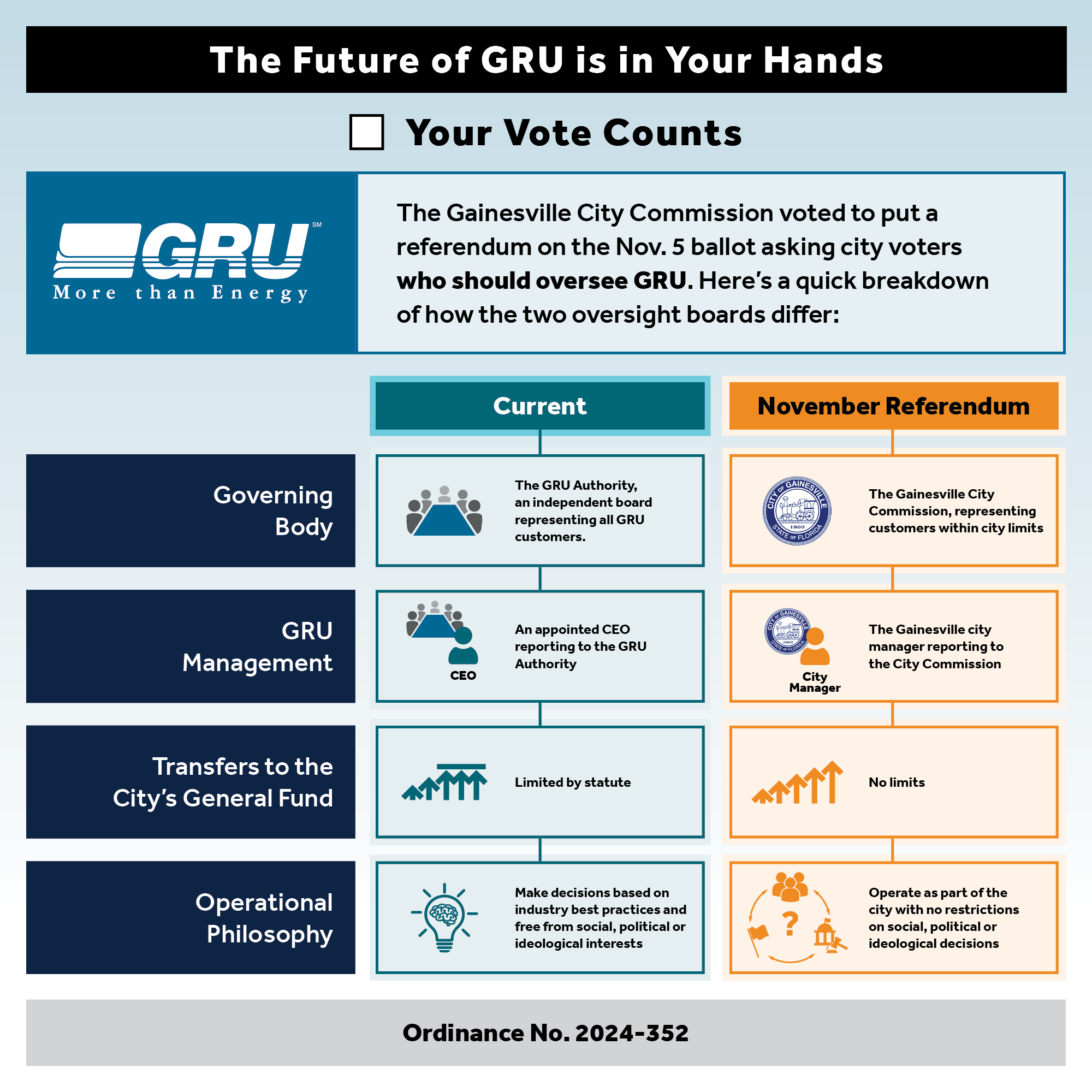 Welcome to the new GRU – one focused on becoming the utility our customers can afford. While I am the new chief executive officer, I am not new to GRU. I previously served as GRU’s general manager from 2015 to 2022 while being governed by the Gainesville City Commission. I'm confident I understand the wants and needs of our local community: the politics; the resources; and our values. One of my proudest accomplishments from my original tenure was getting the utility out of an expensive contract with the Gainesville Renewable Energy Center, often referred to as the biomass plant. In 2017, I negotiated GRU out of the contract and purchased the plant. This action ultimately saved customers more than $1 billion and reduced bills by 8 to 10 percent. Prior to my career at GRU, I was chief operating officer and chief financial officer of the Lehigh County Authority in Allentown, Pa., where I shepherded a one-of-a-kind 50-year concession arrangement with the City of Allentown. My goal at GRU is to make it a utility our customers can afford, which includes drastically reducing debt and operating more efficiently. As the CEO, I hope to be a valuable resource for our customers and created this page so I can address important issues as they arise.
Welcome to the new GRU – one focused on becoming the utility our customers can afford. While I am the new chief executive officer, I am not new to GRU. I previously served as GRU’s general manager from 2015 to 2022 while being governed by the Gainesville City Commission. I'm confident I understand the wants and needs of our local community: the politics; the resources; and our values. One of my proudest accomplishments from my original tenure was getting the utility out of an expensive contract with the Gainesville Renewable Energy Center, often referred to as the biomass plant. In 2017, I negotiated GRU out of the contract and purchased the plant. This action ultimately saved customers more than $1 billion and reduced bills by 8 to 10 percent. Prior to my career at GRU, I was chief operating officer and chief financial officer of the Lehigh County Authority in Allentown, Pa., where I shepherded a one-of-a-kind 50-year concession arrangement with the City of Allentown. My goal at GRU is to make it a utility our customers can afford, which includes drastically reducing debt and operating more efficiently. As the CEO, I hope to be a valuable resource for our customers and created this page so I can address important issues as they arise.
— Ed Bielarski, Chief Executive Officer
One Utility; One Goal: Customer First
Jan. 15, 2025
I presented the following outline of priorities to the GRU Authority on Wednesday, Jan. 15. These priorities will guide us through the year and into the foreseeable future.
- Improved Customer Experience
- Redesigned customer portal = virtual lobby
- Customer-friendly policies
- Unified Organization
- In-house human resources and legal
- Separate collective bargaining agreement with the union
- Continued Fiscal Discipline
- Ensure future expense reductions
- First question: Does this expense put customers first?
- Responsibly Modernize Generating Fleet
- Right asset; right time; right price
- Continued Debt Reduction
- Reduced city fund transfer = more money to pay debt
- Move toward 70% leverage
- Competitive Electric Rates
- No rate increases in fiscal years '25, '26 and '27
- Move toward state average
- Complete City Transition
- Redefine relationship, including agreements for services
- Successful conclusion to GRU referendum complaint
- Build on synergies
Top 10 GRU Authority Accomplishments
Jan. 7, 2025
No. 10: Ended subsidization of new rooftop solar net metering customers.
No. 9: Challenged city efforts to impose fees and permit requirements for right-of-way access and thwarted the city’s plan to force GRU to pay city obligations under its streetlight agreement with the county, saving over $2 million a year.
No. 8: Formalized GRU’s Customer First initiative, starting with an in-person Customer Advocacy Program.
No. 7: Entered into a natural gas prepayment agreement, saving $1.9 million a year initially and growing as more agreements are finalized.
No. 6: Ended exclusivity with the city attorney’s office, enabling the Authority to file a complaint against a city-led referendum that would return GRU governance to the city commission and resulting in an injunction against implementation of the referendum results.
No. 5: Awarded a $47 million Department of Energy grant for infrastructure improvements, plus a host of community benefits.
No. 4: Approved a GRU-exclusive Human Resources Department with a separate collective bargaining unit for union employees.
No. 3: Formalized a 10-year reduction of the fund transfer to the city (from a peak of $38 million-plus to just over $8 million). Used cost savings to reduce long-term debt by over $50 million in 2024.
No. 2: Changed GRU’s residential rate tier structure, lowering bills for 59 percent of electric customers.
No. 1: The sum of these accomplishments allowed GRU to forego base rate increases in 2025. Additionally, the average 1,000 kWh residential electric bill fell from $156 a month to $137. Clay Electric, GRU’s closest competitor, is $136 for a 1,000 kWh residential electric bill.
A note about the GRU oversight referendum
The Gainesville City Commission voted unanimously to put a referendum on the Nov. 5 ballot that would ask voters if the City Commission or the GRU Authority, an independent board, should oversee GRU. The governing body's primary responsibilities are setting utility policy and establishing rates. The following graphic helps explain some of the differences between to two boards.

Q&A with the CEO
The following questions address GRU-related issues common to social media and the local news. I will use this space to share insights into topics that affect GRU customers and update it as new issues arrise.
Do all GRU customers get to vote on the November referendum?
No. Only city residents get to vote on the referendum. About 40 percent of GRU’s electric customers reside outside city limits and won’t have a voice in the process of determining the utility’s governing board. As a reminder, the referendum is a vote initiated by the Gainesville City Commission after the state removed GRU oversight from them and appointed the GRU Authority, an independent board.
If the referendum passes, the GRU CEO would report directly to the city manager. Is this a standard practice among municipal utilities?
If the referendum passes, the management of GRU would be fully determined by the city manager. That means potential removal of the CEO, management team and any other employee. Of the largest municipal utilities in the state, JEA (Jacksonville), OUC (Orlando), KUA (Kissimmee) and GRU all have a CEO or general manager reporting to an appointed board. Only Tallahassee Electric and Lakeland Electric have a general manager, director or manager overseeing the utility and reporting to the city manager.
Is GRU trying to eliminate rooftop solar?
No. GRU pays rooftop solar customers for the excess energy they add to the grid. Under our previous model, GRU paid those customers more than it would have cost us to purchase the power. This resulted in electric customers subsidizing rooftop solar customers. Under the current model, GRU pays rooftop solar customers the same price it would pay other power providers to purchase the energy. It is a fair and equitable solution.
What is the Government Services Contribution?
The Government Services Contribution, which used to be known as the General Fund Transfer, is utility revenues paid to the City of Gainesville to support other city services. This is a standard practice among municipal utilities. The size of GRU’s contribution has fluctuated over the years from a high of more than $38 million to its recently reduced fiscal year 2025 level of around $8 million. The money to pay the contribution is built into utility rates but has in the past required the utility to take money from reserves, which were often replenished by borrowing money.
Why has GRU reduced the amount it pays to the city’s general fund through the Government Services Contribution?
GRU paid $68 million more than what it made between 2018 and 2021, including more than $38 million in two consecutive years. The city commission and GRU developed a new formula to reduce the payment to $15.3 million last year after a state mandate. The GRU Authority recently reduced the payment by an additional $6.8 million a year beginning in 2025 to recoup the $68 million GRU paid in excess of its profits. These reduced payments are part of a larger plan to lower debt and become the utility our customers can afford.
Why has GRU paused its Integrated Resource Plan (IRP)?
An integrated resource plan is an assessment of future energy needs and a plan to meet those needs. GRU has stopped making changes to its current IRP, which has been in the works since spring of 2023. We are reviewing the findings and assumptions for accuracy as well as accountability. Just like the 2019 IRP, the process will lead to a better understanding of GRU’s future energy options.